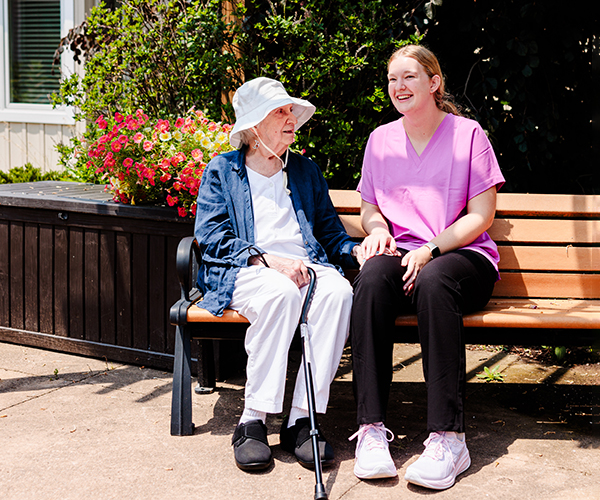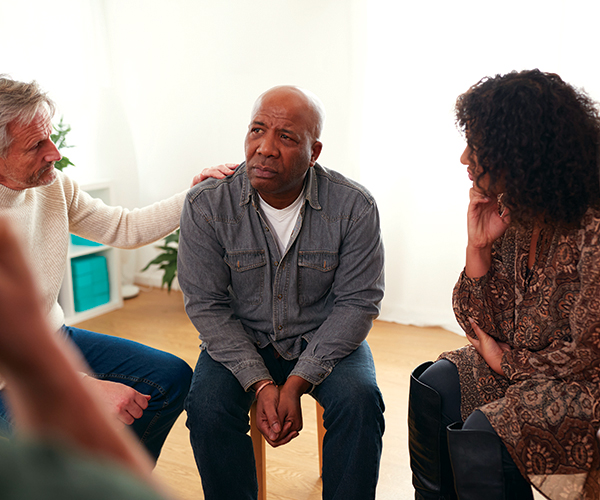Joyce Korver was filling her shopping cart with Christmas presents for her grandchildren when her cell phone rang. It was her gynecologist.
“You have ovarian cancer,” he told her as she stood near the toys. The shock surged through her body. She burst into tears, turned to her daughter and whispered the dreaded “C” word for the first time.
At her annual exam just a few months earlier, she had asked her doctor about her risk for ovarian cancer. She had heard the risk might be higher in women who go through menopause late. At 60, she was just three or four years past menopause. The average age menopause begins is 51.
But since there are no general screening tests for ovarian cancer, the doctor did nothing. Months later, when Korver complained of pain in the right side, he ran an ultrasound that showed the suspicious mass. When it was removed, it was the size of a grapefruit.
Korver, now 67, of Euclid, is a grandmother of 15 and a full-time administrative assistant at Rockwell International. The cancer that started in her ovaries eight years ago has returned four times, and she is about to undergo another extensive round of chemotherapy to fight it off.
While Korver had been diligent about seeing her gynecologist yearly after menopause, many women think going through menopause or having a hysterectomy gives them freedom to go without an annual exam. Some discover — often after they’ve developed problems — that they should have been going all along.
Women need gynecological care at every stage of life, doctors say. After menopause, they should still see a doctor annually — and make sure the doctor gives them an annual pelvic exam.
“I recommend that a woman see a physician once a year, whether she needs a Pap smear or not,” says Dr. Holly Thacker, director of the Women’s Health Center at the Cleveland Clinic Foundation.
A woman might not need an annual Pap smear, but she still needs an exam to check the vagina, the bladder, the rectum, the external genitals — and, of course, the uterus and ovaries, if they haven’t been removed.
“I personally never stop doing Paps on women, regardless of age,” adds Thacker, “because how do you know if they haven’t had a new sexual partner or their partner hasn’t had a new partner?”
Cervical cancer is linked to the sexually transmitted human papilloma virus (HPV). Thacker says she has seen cervical cancer in women in their 80s, even though they’d been cancer-free and monogamous through their 70s. Though the new HPV vaccine is most effective for young women who haven’t become sexually active yet — currently, vaccination is aimed at females ages 9 to 26 — older women can ask their doctor whether the vaccine might be appropriate for them too.
Many women in their senior years remain sexually active, or start new sexual relationships after being widowed or divorced. But if it’s been awhile since they’ve had intercourse, they need to be aware of both sexually transmitted diseases and the changes in their body following menopause.
“If women begin sexual activity, they should have a pelvic exam,” says Dr. Jim Liu, chairman of obstetrics and gynecology at University Hospitals’ MacDonald Women’s Hospital. “Women can get gonorrhea, even in this age group, so having their partner wear a condom is totally reasonable, even if it’s not for contraceptive reasons.”
A more likely result of intercourse in later years, says Liu, is vaginal tearing. Lack of estrogen after menopause can thin the walls of the vagina. That, combined with a lack of intercourse for years, can cause the vagina to shrink. Older women who haven’t been sexually active or who have stopped going to a gynecologist might be unaware that treatments, including dilators, estrogen rings, tablets and crèmes and lubricants, can help them resume a healthy sex life.
“My motto is that every woman is entitled to a healthy vagina,” Thacker says.
Of course, the biggest fear of women in this age group is cancer. Any bleeding after a woman has gone six months without a period should be checked by a physician.
Women who have not had a hysterectomy or who have had only a partial hysterectomy — meaning they still have their ovaries — still need an annual pelvic exam.
While a Pap smear will screen for cervical cancer, ovarian cancer remains difficult to detect early. The symptoms — bloating, fullness, a change in bowel habits — are also common with other disorders, but should always be evaluated by a doctor.
Doctors say the blood test used to detect ovarian cancer, called a CA-125, is not reliable enough to be used as a diagnostic tool in the same way a Pap smear screens for cervical cancer.
“You can get a normal CA-125 and still have ovarian cancer, so a normal test doesn’t reassure you,” Liu says. On the flip side, he adds, a patient with an abnormal test might not have ovarian cancer at all.
Some women think it’s best to have a complete hysterectomy so they won’t have to worry about ovarian cancer down the road. Doctors disagree.
“That previous old adage of, ‘Well, you’re over 50 and we have to go in and take your uterus out anyway, so let’s just take the ovaries,’ is very antiquated,” Thacker says. Keeping your ovaries actually seems to help longevity, at least up to age 65, he adds, unless you carry the breast and ovarian cancer gene. Women with a strong family history of breast or ovarian cancer may want to have genetic testing to see if they carry either the BRCA-1 or BRCA-2 breast cancer gene.
While women fear cancer, one of the most common gynecological issues for those over 60 is called pelvic organ prolapse, where the uterus, bladder or rectum descends through a woman’s vagina and needs to be surgically repaired. Often, it occurs because a woman damaged some muscles and soft tissue years earlier during childbirth, and they continued weakening due to aging.
Perhaps the most common problem older women suffer from is bladder leakage or having to frequently go to the bathroom.
“I see a lot of patients who have stopped exercising or dancing or golfing because they’re afraid they’re going to leak when they do those things,” says Dr. Jeffrey Mangel, director of MetroHealth Medical Center’s division of urogynecology and reconstructive pelvic surgery.
Unfortunately, many women assume that bladder leakage is a normal part of aging and that they need to suffer through it. Or they fear that if they mention it to anyone, their children will put them in a nursing home.
In fact, Mangel says, there are numerous treatments, including retraining the bladder through therapies, medications and surgeries — most of which are done as an outpatient. They can be done on a woman in good health, no matter what her age.



